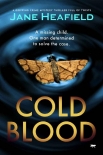Cold Blood, Jane Heafield [uplifting novels TXT] 📗

- Author: Jane Heafield
Book online «Cold Blood, Jane Heafield [uplifting novels TXT] 📗». Author Jane Heafield
‘Surely the rule is you just don’t discuss the Argyles with Lopers? Seriously, what happened to them? Did they get eaten by Bakhtak?’
‘No, I can’t tell you. I really can’t.’
Lorraine had given him the low-down on the Keys. Everyone had to follow their rules and disobedience was punished. A teenaged tearaway had been banned from the Red Lion and given a 9pm curfew. A shopkeeper had been forced to shut his shop for a week because he’d sold alcohol to underaged Lopers. And an event back in the 1980s was still shrouded in mystery – a man had been evicted from the village, with just the clothes he wore, for getting a facial tattoo.
Liam had cracked a joke about getting put in the stocks and pelted with tomatoes, but he hadn’t really taken it seriously. He’d been consumed by police work and uninterested in village matters or gossip. Now that he thought about it, the whole shebang with the Keys seemed a bit scary.
‘You know, there’s no legal basis for what the Keys do, Gemma. They can’t punish you for disobeying their unofficial rules.’
‘I know, but we all agreed, didn’t we? I mean, the Keys aren’t councillors or anything, except Mr Turner. He’s been one for about four terms now. He covers a few parishes and he’s mostly involved with car parks and recreation grounds. But the Keys are something he put together off-the-books, if you like. They’re not official but we’ve all accepted it and it’s been that way for fifteen years or so. I guess it’s like playing Monopoly, and the Keys are the banker. If you want to play the game, you obey the rules of the banker, but you can quit the game at any time.’
By leaving your home? Sweet. The Monopoly analogy sounded like a gem written by the Keys to justify their actions, perhaps the brainchild of their top dog, Richard Turner, bachelor, vet, councillor. Whatever. Not his concern. He had his own life to worry about and it was time to get back to it.
16
His detective paranoia buzzed as he left the hotel. The car park had space for thirty vehicles and the five that had been here when he arrived were scattered. Now a new car had arrived, and it was parked right next to his own, facing the opposite way so that both driver’s doors were close. He approached casually, aware of all the times a police colleague had been attacked by a disgruntled criminal or angry family member of one.
He could see the outline of someone in the driver’s seat. He approached his passenger side, for caution, and watched the driver wind their window down. It was a large woman, about sixty. She wore a blue-and-white uniform shirt and had a name badge, although he couldn’t read it at this angle. She spoke rapidly.
‘You’re the detective who’s come here. I need to speak with you. Quick. Please.’
Word had travelled fast. ‘About what?’
‘Not here. We can’t be seen.’ She tossed a ball of paper onto his bonnet and drove away, fast. He noted the registration number just in case a coming day required a trace and picked up the balled paper.
There was a sketch of what looked like a pair of lollipops with their heads facing each other. Between them was a circle with GRASS written inside. One of the lollipops was labelled ARTON PLACE and had an arrow running across to the other, GRODES PLACE, at whose end was a little square house with an X. The arrow said FOLLOW THIS. A rough map, it seemed. Apparently he was supposed to go down Arton Place, cross some grass, and meet the woman at one of the houses on Grodes Place.
It tingled his detective senses. This woman wanted to tell him something and was worried about eavesdroppers. But it was almost one o’clock and he had to pick Joe up at three. He considered his options and made a decision. He called one of his team, a sergeant called Sienna Todd, and asked her to go pick up Joe because he was stuck in a place called Lampton in the Peak District. She agreed and he called the school to inform them.
Google Maps told him Arton Place and Grodes Place, his destination, were cul-de-sacs with a small green area between them. But he also noticed something curious. Although the entry to Arton Place was just across the road, between the four red-brick houses, there was no through route for a vehicle. For a crow, the simplest way was to follow the arrow on the sketch map, as advertised, but a driver would have to take a more winding journey to reach Grodes Place. And the woman who drew the map knew he was in a car.
He exited the car park, turned right and just seconds later spun the wheel left, onto Arton Place. The street was lined with semi-detached homes with small gardens. Beyond the turning circle at the end was an alley splitting a pair of detached homes, with trees beyond. He parked.
At the end of the alley the trees parted for a cycle barrier. This was where he stopped, staring out into a green area about a hundred metres long and ringed by trees. In the centre was a basic children’s playpark. At the far side he saw the end houses of Grodes Place poking above the trees. Nobody was about.
Why had the woman wanted him to come this way, knowing he’d have to leave his car? Perhaps she figured he wouldn’t mind a stroll, or maybe there were roadworks blocking the other route. The reason could be completely innocent, but he’d been a policeman too long to ignore





Comments (0)